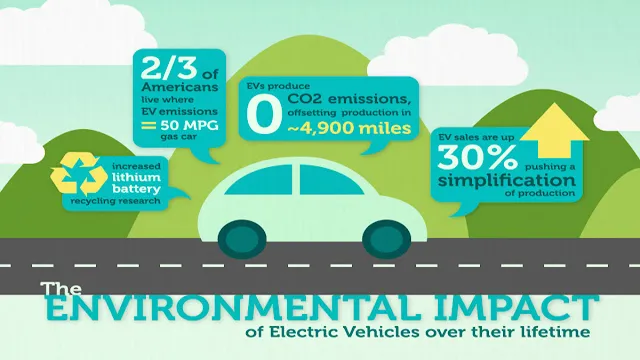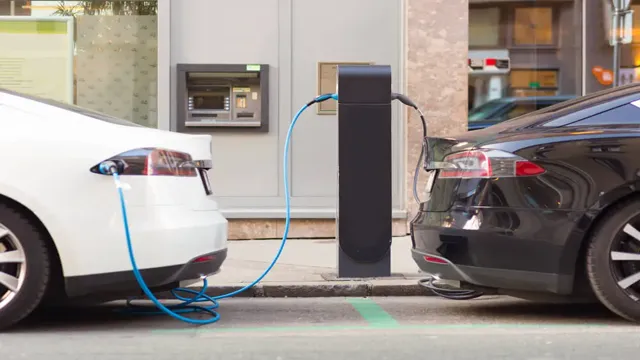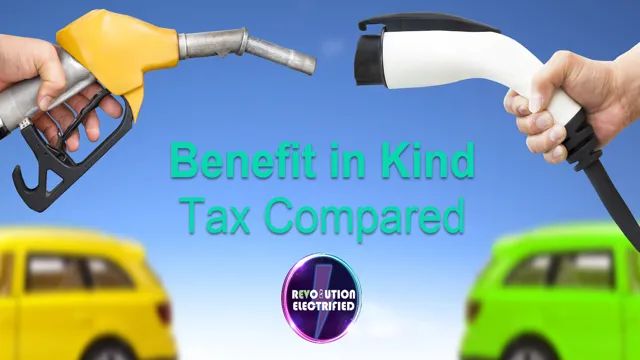Going Green with Electric Cars: Unlocking the Environmental Benefits [Cited Studies]
Have you ever wondered how driving an electric car can help the environment? If so, you’ve come to the right place! Electric cars are becoming more and more popular, partly because of the numerous benefits they offer. Among these benefits, one of the most important is their positive impact on the environment. That’s right, by opting for an electric car, you can make a big difference in reducing carbon emissions and promoting a cleaner, greener planet! In this blog post, we’ll explore the many environmental benefits of electric cars and why they’re a great choice for eco-conscious drivers.
Reduced Greenhouse Gas Emissions
Electric cars offer several environmental benefits, with one of the most significant being their ability to drastically reduce greenhouse gas emissions. Unlike gas-powered vehicles, electric cars don’t produce harmful emissions from their tailpipes. According to EPA, electric vehicles emit an average of 4,410 pounds of CO2 equivalents per year.
In contrast, gasoline vehicles emit an average of 11,435 pounds. This significant reduction in emissions results in a cleaner environment, better air quality, and improved public health outcomes. Additionally, electric cars can be powered by renewable energy sources such as solar or wind, further reducing their environmental impact.
By driving an electric vehicle, you can help to reduce carbon emissions, slow climate change, and protect the planet for future generations. So, if you’re looking for a way to reduce your carbon footprint and combat climate change, an electric car is an excellent choice.
Electric cars emit significantly less CO2 than gas-powered cars.
Electric cars represent the future of transportation and play a crucial role in reducing greenhouse gas emissions. Running on batteries, these vehicles operate with much lower CO2 emissions compared to traditional gas-powered cars. Driving an electric car can significantly reduce your carbon footprint, and many power companies now offer green energy plans to further reduce emissions.
Additionally, electric vehicles have superior energy efficiency, making them cheaper to operate in the long run. While a gas-powered car releases about 6 metric tons of CO2 per year, an electric car emits only about
5 metric tons. This difference in emissions becomes even more significant when multiplied by the millions of cars on the road. Switching to electric cars is a simple way to reduce our environmental impact and help protect our planet for future generations.

Electric cars emit no greenhouse gases from the tailpipe.
Electric cars have become a popular alternative to traditional gasoline-powered vehicles in recent years, and for good reason. One of the most significant advantages of electric cars is their reduced greenhouse gas emissions. Unlike gas-powered cars that emit pollutants from their tailpipes, electric vehicles produce no emissions at all from the tailpipe.
This is because they run on electricity stored in batteries rather than on fuel. While carbon dioxide emissions may still be associated with the generation of electricity used to fuel the car, overall, an electric car produces far fewer emissions than a gasoline-powered vehicle. With concerns over climate change and the need to reduce our carbon footprint, choosing an electric car can be an excellent way to help protect the planet and promote sustainable living.
So, if you’re looking to make a positive impact on the environment, switching to an electric car is definitely a step in the right direction.
Increased Energy Efficiency
One of the biggest environmental benefits of electric cars is their increased energy efficiency. Compared to traditional cars that run on gasoline, electric cars convert more of their stored energy into motion, resulting in less waste. According to the U.
S. Department of Energy, electric vehicles operate at an efficiency of 59-62%, compared to gasoline vehicles that are only 17-21% efficient. This increased efficiency means that electric cars can travel farther on a single charge, reducing the need for frequent trips to the gas station.
Additionally, it means that electric cars produce fewer greenhouse gas emissions and have a smaller overall carbon footprint. As more and more renewable energy sources are integrated into the grid, the environmental benefits of electric cars will only continue to grow. By driving an electric car, individuals can take an active role in reducing their carbon footprint and helping to create a more sustainable future.
Electric cars are more energy-efficient than gas-powered cars.
Electric cars have become an increasingly popular choice due to their greater energy efficiency compared to gas-powered cars. Not only do they produce fewer emissions and have a lower overall environmental impact, but electric cars can also convert over 75% of the energy stored in their batteries to power the vehicle. This is because a typical gas-powered engine only converts around 20% of its fuel’s energy into motion, with the rest lost to heat and other forms of waste.
Furthermore, electric cars have fewer moving parts, meaning that they require less energy to operate and maintain. As a result, they are not only environmentally friendly but also cost-efficient. By using electric cars, we have the opportunity to reduce our carbon footprint and contribute to a cleaner, more sustainable energy future.
Electric cars recover energy when braking.
Electric cars are becoming more and more popular due to their increased energy efficiency and cost savings. One way in which electric cars recover energy is through regenerative braking. When the brakes are applied, the car’s electric motor is used to slow the vehicle down instead of using traditional brakes, and this generates electricity that is stored in the car’s battery.
This means that not only are electric cars more efficient than gas-powered cars, but they also help reduce wear and tear on traditional brakes and decrease the amount of pollutants released into the environment. By recovering energy during braking, electric cars are able to extend their range and provide a more sustainable and environmentally friendly option for transportation. So next time you’re driving an electric car and come to a stop, remember that you’re helping to save energy and protect the earth!
Vehicle-to-Grid Technology
Electric cars have been receiving attention for their environmental benefits. By converting to electric vehicles from traditional gasoline cars, we can reduce our carbon footprint and help slow global warming. Furthermore, when electric vehicles are integrated with vehicle-to-grid technology (V2G), they can provide additional environmental advantages.
V2G technology allows electric car owners to feed excess power back into the grid, balancing the load and supplying more energy during peak demand periods. This process can lead to less reliance on non-renewable energy sources, reducing emissions and improving air quality. In addition, electric car owners can benefit financially by selling their excess energy back to the grid, creating a more sustainable and cost-effective system.
Electric cars can be used as a battery for the grid.
Electric cars are not only environmentally-friendly vehicles, but they can also serve as a battery for the grid. This innovative technology is called Vehicle-to-Grid (V2G), which allows electric vehicles (EVs) to not only consume electricity from the grid but also to return it when they are not in use. Essentially, the EV owner can connect their car to the grid and sell the stored energy back to the electrical network.
V2G systems can help to balance the grid load and reduce the peak demand for electricity during high usage periods. It also provides additional revenue streams for the electric vehicle owner. Imagine having your electric car earn money while you’re at work or asleep! With V2G, the potential for electric vehicles goes beyond just being a mode of transportation, but a central component of the larger energy infrastructure.
V2G technology could provide a new and smarter way for future energy grids to function, providing reliability and sustainability to the electricity network.
Electric cars can supply power during peak demand periods.
Electric cars are becoming more popular as people prioritize environmentally-friendly alternatives to traditional vehicles. In addition to reducing emissions, electric cars can also assist in balancing the energy grid by supplying power during peak demand periods. This is known as vehicle-to-grid technology (V2G), and it allows electric vehicle owners to contribute to the energy market while their cars are parked and not in use.
Essentially, V2G technology allows electric cars to function as a “power plant on wheels”, delivering energy back to the grid during periods of high demand. By utilizing this technology, we can reduce our reliance on traditional power plants, which tend to be more polluting and less efficient. While V2G technology is still in the early stages, it has the potential to revolutionize the way we think about energy and transportation.
Not only does it provide an innovative solution to balancing the energy grid, but it also empowers individuals to take an active role in creating a more sustainable future.
Renewable Energy Integration
One of the significant environmental benefits of electric cars is that they emit fewer greenhouse gas emissions than gasoline-powered vehicles. As the world continues to move towards renewable sources of energy, electric car adoption is even more critical. Renewable energy sources, such as wind and solar power, can power electric vehicles without producing any harmful emissions.
Research shows that electric cars’ carbon footprint is significantly lower than traditional cars. In fact, electric vehicles can reduce emissions by over 50% when compared to gasoline-powered cars. As such, it is essential to integrate renewable energy sources in electricity grids to maximize the environmental benefits of electric cars.
By doing this, we can reduce greenhouse gas emissions, mitigate climate change, and ensure a sustainable future for generations to come.
Electric cars can be charged using renewable energy sources.
As renewable energy sources become more abundant and affordable, electric cars can now be charged using solar, wind or hydro power. This saves traditional energy sources such as coal and oil, and helps protect the environment by reducing greenhouse gas emissions. With the use of smart grids, electric car owners can control when they charge their vehicles, making sure to take advantage of peak renewable energy production times.
By doing this, not only do owners save on energy costs, but they also support a shift towards sustainable energy use. Admittedly, there are still challenges to integrating renewable energy sources into large-scale electric car charging systems, but with continued innovation and investment, this transportation revolution is only set to expand and benefit the environment in the future.
Conclusion
Electric cars have been touted as the future of sustainable transportation, and for good reason. They offer numerous environmental benefits that traditional gasoline-powered vehicles simply cannot match. By producing zero emissions, reducing pollution, and lowering our dependence on fossil fuels, electric cars are transforming the way we move and creating a more sustainable future for generations to come.
As The Guardian reports, “Electric cars are clearly the environmentally friendly choice for anyone who wants to reduce their carbon footprint and help save the planet.” So, for those of us who are committed to making a difference, let’s embrace electric cars with open arms and ride off into a greener future!”
FAQs
What are the environmental benefits of using an electric car?
Electric cars emit significantly less greenhouse gases compared to traditional gasoline-powered cars, which reduces air pollution and mitigates climate change. Moreover, electric cars do not emit harmful pollutants that can affect the quality of air and public health.
Are there any financial benefits when using an electric car instead of a gasoline car?
Yes, there are several financial benefits associated with using an electric car such as reduced fuel cost, low maintenance cost, and tax incentives. Additionally, Electric cars have higher resale value compared to gasoline cars.
Can electric cars reduce our dependence on foreign oil?
Yes, electric cars have the potential to reduce our dependence on foreign oil significantly. As electric cars can be charged from a variety of sources, including renewable energy sources such as solar and wind power, this reduces the reliance on oil as the primary energy source for transportation.
What is the current state of infrastructure for electric cars?
Electric cars infrastructure is growing rapidly, and governments are providing incentives to support electric vehicles adoption. There are already several public charging stations available across different countries. Furthermore, the installation of more public charging stations is expected to grow as more people adopt electric cars.




